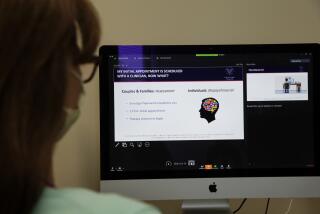Cyber Analysis
- Share via
Kenny Evans knew he needed professional help for depression, but one thing always stopped him. The Russellville, Ark., man is partially paralyzed, and the idea of having to display both his physical disability and his emotional pain was enough to dissuade him from reaching out.
Then Evans, 49, discovered an Internet site operated by a Newport Beach psychologist who counsels patients computer to computer instead of face to face. For Evans, it offered a way to give therapy a try while overcoming his qualms about anonymity and privacy.
For the record:
12:00 a.m. March 13, 2000 For the Record
Los Angeles Times Monday March 13, 2000 Home Edition Health Part S Page 3 View Desk 1 inches; 34 words Type of Material: Correction
Online Therapy--A story in Health on March 6 should have said that an Internet site operated by June Caldwell of Redondo Beach provides referrals to mental health therapists who provide in-person counseling rather than online counseling.
Now Evans e-mails Julie Keck whenever he feels the need, and she responds, usually within 24 hours. Evans credits Keck with helping him gain a new perspective on life.
“She is an empathetic and caring person,” he says. “And I get an unconditional acceptance through her counseling.”
Evans and Keck are among a growing number of patients and therapists using the Internet as an alternative to traditional in-office counseling, helping to push the mental-health field into new territory. Together with other Web sites that offer online chats with doctors, interactive health assessments, and personalized diet and fitness programs, online therapy is further establishing the Internet as a powerful provider of health information and services.
Online therapy, which typically involves an exchange of e-mails over hours or days rather than an almost simultaneous conversation, or “real time” chat, seems to capture the essence of Internet communication--anonymity, convenience and uninhibitedness. And patients and therapists say the medium helps lessen some of the stigma about mental-health counseling that can discourage some people from seeking treatment.
Americans are generally reluctant to seek out mental-health counseling and to stick with it once they start. About 30% of people who make a first appointment for counseling don’t show up, and many people never return after a first session, says John Grohol, a psychologist in Austin, Texas, who has studied the subject.
One recent study suggests that people are less reticent about seeking mental-health information in the anonymity of the Internet. A report in Behavioral Healthcare Tomorrow, a professional journal, found that an estimated 40% of all health-related Internet searches are on mental-health topics.
But online therapy is not without its critics, who cite concerns over the quality of online therapy and issues of privacy and legal protections.
Dr. Walter E. Jacobson, a Los Angeles psychiatrist, says that while online therapy may reach people who might otherwise not seek counseling, it lacks a crucial element in the relationship between patient and therapist: “A bond has to form--being able to make eye contact, how comfortable they are. You are not going to get that in e-mail. I think sometimes the treatment may be suboptimal.”
Even so, Jacobson echoes other experts who say that online counseling is probably here to stay. He believes the mental-health profession needs to develop guidelines to regulate such counseling.
“Most people recognize this is one of those snowballs that you can’t stop from rolling down the hill,” Grohol says. “It’s a question of how can you do it the most ethical and effective way possible.”
Keck, a clinical psychologist who is Kenny Evans’ counselor, was introduced to online therapy in 1997 after receiving an e-mail from a distraught college student named Joseph. He had picked her name from a list of psychologists and wanted to know if she would do e-mail counseling.
“I decided to try it with just that one person,” Keck says. Based on that and later experiences, Keck created a Web site called CounselingCafe.com and now does 40% of her counseling online while also maintaining a traditional office practice. She acknowledges that there are limits to the type of counseling that can be done over the Internet.
“I call it ‘e-mail counseling,’ ” she says. “This isn’t therapy. Therapy is a lot more leading the patient to their own solutions . . . learning who they really are. E-mail counseling is more like direct advice. Anyone who says it’s more than that is fooling themselves.”
Joseph, who asked to be identified only by his first name, says that at the time he contacted Keck, he was spending most of his freshman year in his room due to a then-undiagnosed anxiety disorder that made him highly fearful of social interaction.
“I wanted to find help, but I was afraid of going to a public health clinic,” says Joseph, now 23. “My biggest problem was the bad reputation people can get when they seek mental health care. And, when you suffer from the disorder I have, you are nervous about the social impact of seeking therapy. So a computer was an easy way to talk to someone.”
For almost a year, Keck and Joseph exchanged e-mails every few weeks. She sent him information about social anxiety and recommended books and articles. Finally, Joseph decided to seek face to face therapy at his school’s health clinic, where his disorder was formally diagnosed. He began receiving behavioral therapy and medication.
Now recovered, Joseph says he would recommend online therapy to others as a way to get started, while adding that he believes “it’s important to see someone face to face in the long run.”
Teresa Austin, a 45-year-old school librarian on the East Coast, stumbled across an online therapy Web site one day during a troubled period when she and her husband were separated.
She exchanged e-mails with a therapist who offered advice and recommended books for the couple to read. The therapist also urged the couple to see a local marriage counselor who, Austin says, helped move them “toward a resolution.”
Many people appreciate and can benefit from limited e-mail exchanges with therapists, says Rick Harrison, a marriage-and-family therapist in Newport Beach. Harrison launched his e-therapy Web site--PsyNet.com (with the catchy home-page headline: “The Shrink Is In”) in 1996.
“People aren’t looking for therapy on the Internet,” Harrison argues. “They are looking for fast answers to questions under the cloak of anonymity. They ask questions that they wouldn’t ask face to face.”
Many mental-health professionals appear to endorse limited use of the Internet. Writing last year in the journal Cyber Psychology and Behavior, Vicky Laszlo, a counselor based in Marlboro, N.J., says online counseling has its roots in educational Web pages and online questionnaires that screen for conditions like depression or anxiety.
Most online therapists are marriage-and-family therapists and psychologists, with almost half possessing PhDs, according to Laszlo. Fewer psychiatrists appear to be seeking clients on the Internet. She said her informal survey of fees shows that therapists are charging about $18 an e-mail, on average.
Professional organizations, including the American Psychiatric Assn. and the American Psychological Assn., are monitoring the growth of online therapy.
“We get a lot of calls into the ethics office in which people say they are thinking of doing this,” says Dolph Printz, director of ethics for the American Psychological Assn. “We get incredibly thoughtful and complicated questions that we simply don’t have answers to.”
In January, the International Society for Mental Health Online, a professional and consumer group founded in 1997, released guidelines for online therapy that deal with such issues as privacy, disclosure of the therapist’s credentials and the promptness of e-mail responses. (A full list of the guidelines are available at the group’s Web site: https://www.ismho.org.)
Many mental-health professionals, however, are concerned about the lack of research demonstrating the effectiveness of online therapy.
June Caldwell, a marriage-and-family counselor in Redondo Beach, started a counseling Web site with some colleagues two years ago that provides free referrals to online therapists.
“We were curious whether the Internet would be a quality way for us to do counseling,” Caldwell says. “We realized there is a need. But we also realized there are a lot of people who are not serious about counseling. It became a problem as to how to sort out who is appropriate for counseling.”
Caldwell says she remains uneasy with the many unresolved aspects of e-therapy, such as how to handle clients who suffer a crisis, how to ensure privacy and confidentiality and how to abide by state laws governing mental-health service practices.
Jacobson, the Los Angeles psychiatrist, says he most fears a situation in which a client becomes suicidal.
“When you’re online, you can’t see someone getting tense, getting upset, getting guarded,” he says. “In a room, you can de-escalate. You can say, ‘Let’s back away,’ calm them down and get to a safe place. While online, you may not know that they’re freaking out. They may even be on the verge of suicide, and you can’t do a thing.”
Keck says she once had to ask police in a client’s hometown to check on him. She insists on obtaining a client’s real name, address and phone number.
But listing personal, identifying information in an e-mail that may include intimate issues of one’s life is another problem in the world of e-therapy. Not only can hackers break into computer files, any printed record of the e-mail exchange (which both therapists and clients often claim they like to keep in order to review what has been discussed) might end up in the wrong hands.
“There is no confidentiality to e-mail,” says Dr. Zebulon Taintor, chairman of the American Psychiatric Assn.’s Committee on Telemedicine, which favors the use of video-conferencing technology, rather than computer e-mail, for counseling sessions that take place between patients and therapists in different locations.
Since therapists must be licensed in every state in which they practice, it isn’t clear whether online therapists who counsel clients out of state are breaking the law.
In addition, participants may not be covered by such laws as therapist-client privilege, which protects a therapist from divulging in a court of law confidential exchanges that took place during therapy.
But the risks of using an out-of-state therapist may pale compared with the risk of using an unlicensed therapist. Online therapy is a magnet for charlatans, experts say. And it takes some effort to check out the credentials of online therapists.
At least one person is trying to help consumers locate qualified online therapists. Martha Ainsworth, an Internet consultant in Princeton, N.J., has established a Web site (https://www.metanoia.org) that lists online therapists and even ranks them based on verification of credentials and a review of their Web sites.
Like scrolling through a list of books on Amazon.com, consumers can select an appealing therapist and click into their virtual office.
The alternative? Consult with friends or a phone book for a therapist. Muster the courage to call the office. Commit to an appointment. Drive to the office. Sit in the waiting room. Take a chair across from a stranger.
Not Kenny Evans.
“It is a comfort to me to be able to sit down and e-mail Dr. Keck any time of the day or night without an appointment and know that she’ll respond within 24 hours or sooner,” Evans says. “I think this is an idea that will only add to the mental health field and will help shape it for the better for folks like me.”
(BEGIN TEXT OF INFOBOX / INFOGRAPHIC)
What You Should Know When You Log On
The International Society for Mental Health Online (https://www.ismho.org) recently released principles to help protect therapists and consumers communicating online. The principles include:
* The client should be informed about the process, potential risks and benefits of the service, safeguards against risks, and alternatives to the service.
* Clients should be told that misunderstandings are possible. They should be told how quickly therapists will respond.
* The client should know the name of the counselor, the counselor’s qualifications (including degree, license and certification), and any special training or degrees. The client should be told how to confirm this information with relevant institutions (such as the state licensing board).
* The counselor should remain within his or her boundaries of competence, and not attempt to address a problem online if he or she would not attempt to address the same problem in person.
* The counselor should meet any necessary requirements (such as state licensing) to provide services where he or she is located and, if necessary, where the client is located.
* The counselor and client should agree on the frequency and mode of communication, method for determining the fee, the estimated cost to the client, and the method of payment.
* The counselor should adequately evaluate the client before providing services.
* The confidentiality of the client should be protected.
* The counselor should maintain records of the online services. If those records include copies of communications with the client, the client should be informed.
* Procedures to follow in an emergency should be discussed. The counselor should obtain the name of a local health-care provider who can be contacted in an emergency.






